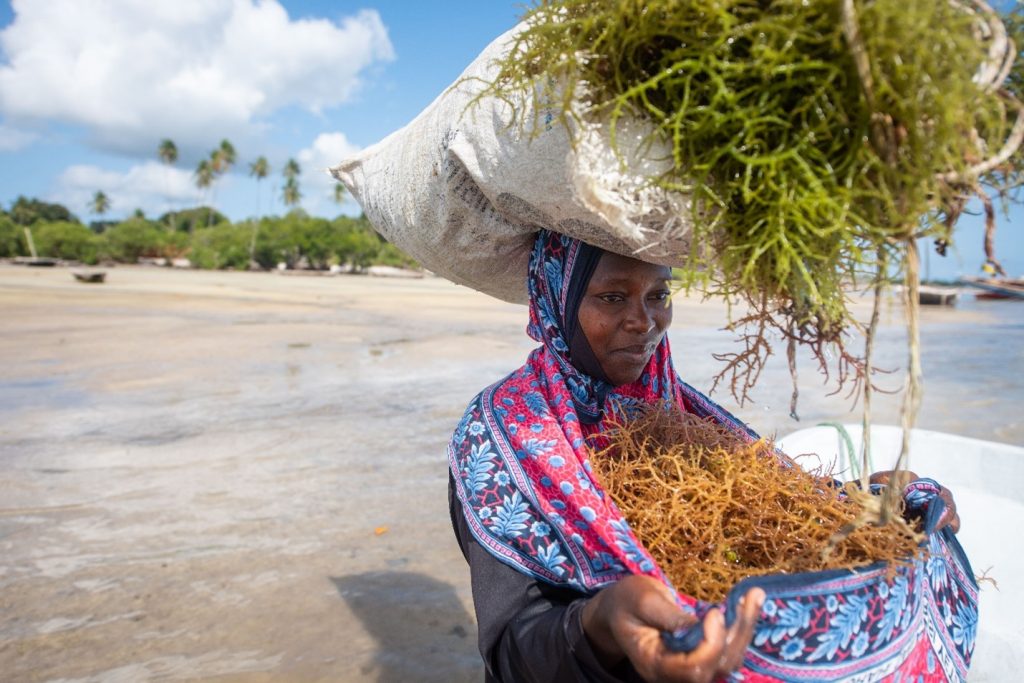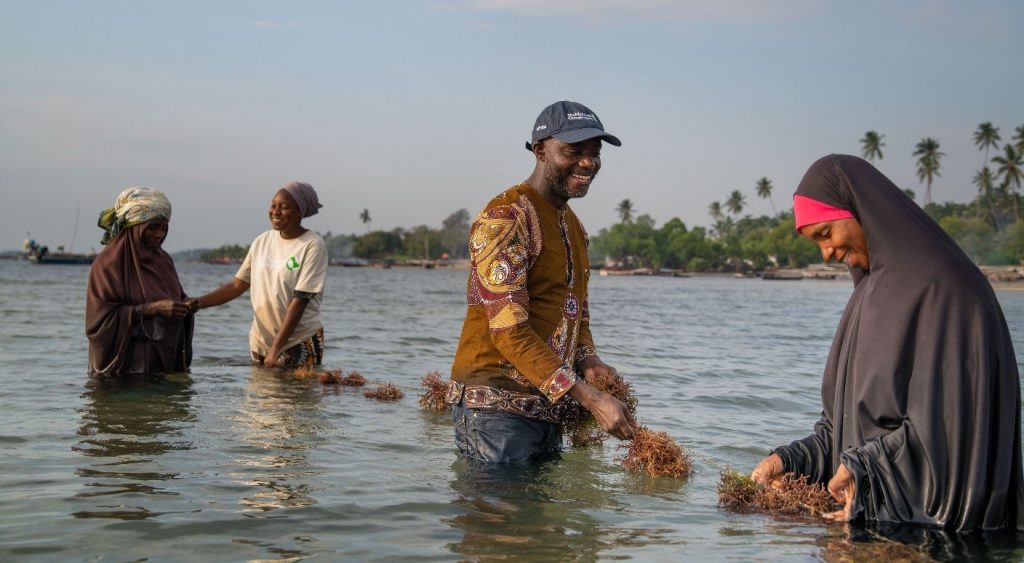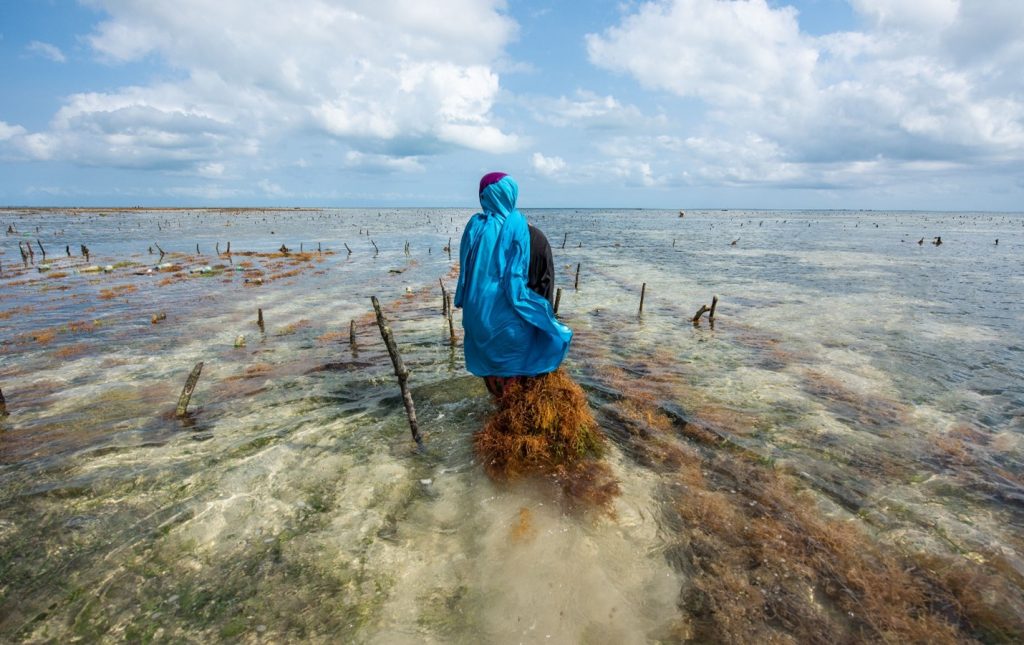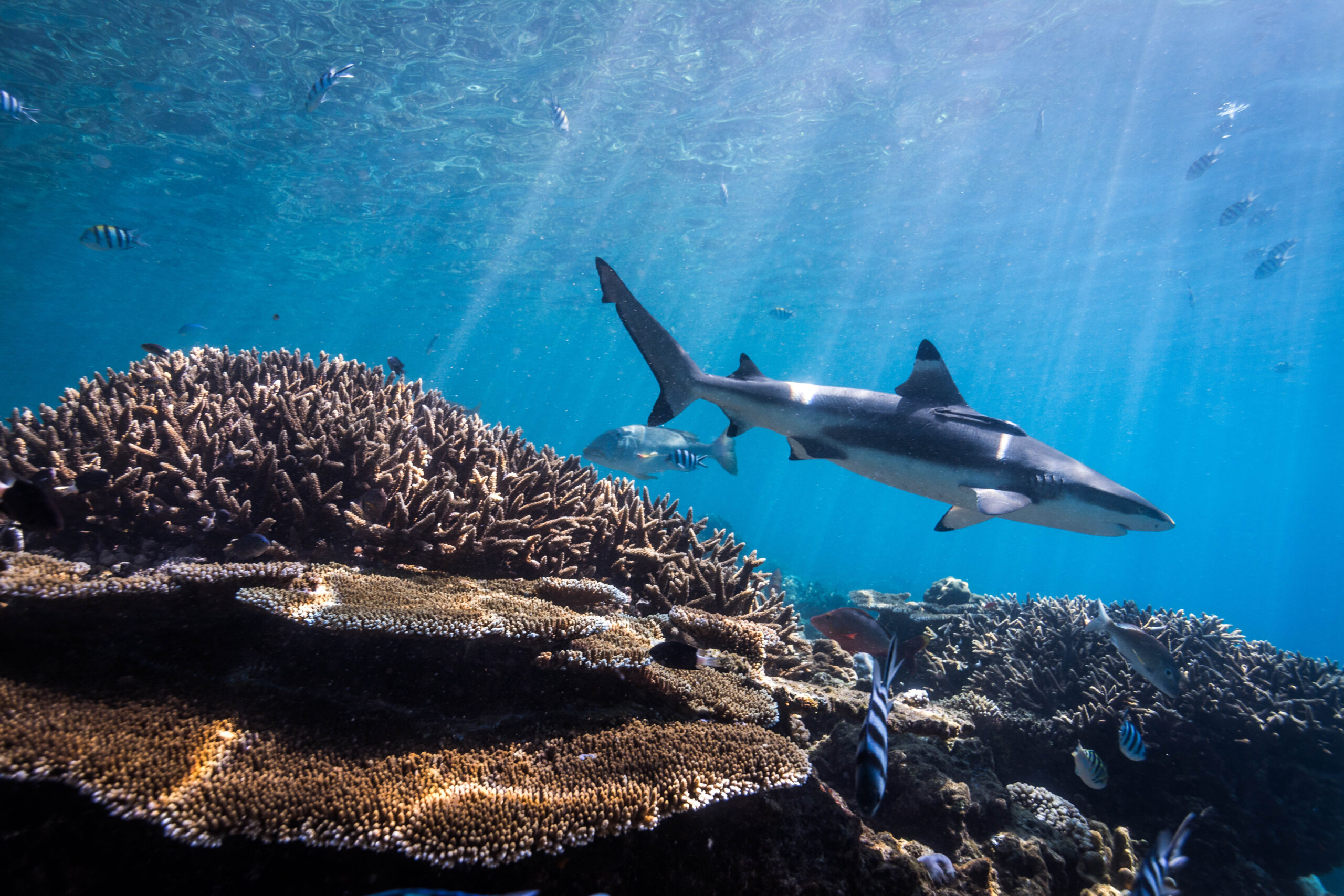Building Capacity for Sustainable Seaweed Cultivation in Zanzibar
Location
Unguia and Pemba Islands, Tanzania’s Zanzibar Archipelago
The challenge
Seaweed farming is the third largest export industry in Tanzania. It employs over 25,000 farmers, 80% of whom are women. In Tanzania’s Zanzibar Archipelago, seaweed has become the third largest source of income and accounts for nearly 90% of its marine exports. Most of the seaweed farmed is dried and sold for use as carrageenan or agar thickening agents in a variety of products such as toothpaste, ice cream, and cosmetics.

Seaweed farmer on Pemba Island. Photo © Roshni Lodhia
Although the demand for seaweed is expected to increase, seaweed farmers face major challenges in sustaining this vital industry in Zanzibar. The combination of warming oceans due to climate change, impacts of coastal development, limited aquaculture knowledge, and poor seed stocks are making it harder for seaweed farmers to sustainably maintain their yields and livelihoods. This is driving them to use unsustainable practices, such as cutting back mangrove forests to make the stakes that secure farms to the seafloor or clearing native seagrass beds to make room for farms. Protecting Zanzibar’s important marine environments while also supporting seaweed aquaculture, especially through education and partnering with local women, is essential to conserving Zanzibar’s waters and wildlife.
Actions taken
To help address challenges to farming seaweed sustainably in Zanzibar, The Nature Conservancy (TNC) partnered with Cargill Inc. to launch a new community-empowerment and environmental-training program. The partnership is a collaboration between TNC, Cargill’s Red Seaweed Promise, C-WEED Corporation Ltd, the Ministry of Blue Economy and Fisheries (MoBEF), and researchers to work with seaweed farmers on Unguja and Pemba Islands. It is also part of a broader collaboration between TNC and Cargill aimed at ensuring sustainable food and agricultural production for future generations.
The program worked with farmers to co-develop a locally appropriate set of seaweed farming best management practices. TNC and collaborators then conducted trainings with farmers on how best to site, design, and manage their farms. These trainings focused on increasing yields while also reducing farming impacts to seagrass, mangrove areas, and coral reefs, in addition to reducing marine debris on beaches and in waterways. Village implementers were also identified and trained to mentor other farmers, build much-needed local capacity, and ensure farmers involved have a local specialist to consult throughout the process.

Seaweed trainers working with local seaweed farmers at the Tumbe seaweed pilot site in Pemba. Photo © Roshni Lodhia
The program is helping ensure that volumes of sustainably farmed seaweed continue to grow for the industry and are traceable through the supply chain, to assure end producers of the social and environmental responsibility of seaweed production. In the longer term, collaborators will work with local research and government partners to identify specific scientific research needs to maintain healthy seaweed stock. These needs include improved seaweed strains that thrive in a changing climate, and potential seaweed policy improvements, that could benefit both seaweed farmers and the environment.
How successful has it been?
The TNC pilot project has been well received by seaweed farmers and the Zanzibar government, which is hoping to benefit from higher export income and the restoration of the archipelago’s rich marine biodiversity, a key attraction for tourists. In its first year, over 180 farmers, 62% of whom were women, were trained, mostly from existing seaweed farmers groups in Unguja and Pemba Islands. An additional 303 people working in seaweed in these farmers’ households were also trained from the original trainee farmers. The project has played a key role in helping mainstream gender into coastal and marine management. There has also been a growing interest from other seaweed industry players and farmers in Zanzibar wanting to adopt best management practices for restorative seaweed aquaculture. The Government is already replicating the training in new villages.
Further improvements observed in post training surveys include:
- 20% reduction in farmers using mangroves for stakes
- 44% reduction from baseline in disposal of plastic ropes at sea
- 528 coastal areas under improved management
Tools
TNC produced a “Tanzania Seaweed Guide” (available August 2022) entitled: Opportunities for increased productivity, traceability, and sustainability of seaweed aquaculture in Tanzania: A seaweed guide for conservation practitioners, seaweed buyers, and government. The Tanzania Seaweed Guide is intended to be a foundation that key players within the seaweed industry, regulators, scientists, and community leaders can use to understand the challenges, opportunities, and better management practices for seaweed aquaculture in Tanzania. TNC’s intent is that it will serve as a foundational document for the Tanzania seaweed program and help support collective action towards greater environmental sustainability and improved livelihoods throughout the seaweed supply chain.
Lessons learned and recommendations
- Partnerships such as TNC’s collaboration with Cargill are necessary for creating resilient and sustainable livelihoods for coastal Tanzanians, while also increasing the ecological benefits that seaweed can provide.
- Mentorship works best when designed based on the unique needs of trainees.
- Identifying model farmers for close and dedicated follow-up support helps increase adoption of best management practices (BMPs).
- Training and awareness materials should be in the local language and a simple format.
- It is important to take into consideration the socio-cultural needs of the community. For example, accounting for and having flexibility with local women’s daily schedules and demands.
- While some BMPs had great potential for boosting farmer and buyer incomes with minimal environmental footprints, they required more time and skill to adopt.

Seaweed farmer on Pemba Island. Photo © Roshni Lodhia
Funding summary
Extra Funding from Margaret A. Cargill Philanthropies
Lead organizations
Partners
Ministry of Blue Economy and Fisheries (MoBEF)
Revolutionary Government of Zanzibar


